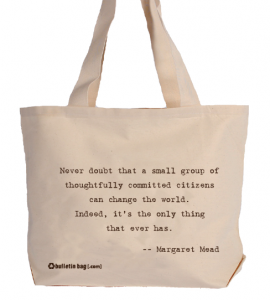 Last month, we wrote about a draft ordinance in Portland, Maine, to ban plastic bags. While it ultimately didn’t take off here (yet!), it has definitely gotten the community talking.
Last month, we wrote about a draft ordinance in Portland, Maine, to ban plastic bags. While it ultimately didn’t take off here (yet!), it has definitely gotten the community talking.
Local landfill and waste managers are speaking up about the damage that plastic bags are doing at their facilities. Three years ago, we first talked about how plastic bags wreak havoc at recycling facilities. Well, that problem hasn’t gone away. C’mon. You really can’t be surprised.
Even though there is a recycling symbol on plastic bags, and even though modern recycling technology makes it possible recycle almost any household item, plastic bags should not be recycled in your curbside bins. Automated single-stream recycling equipment can’t sort them—even if they don’t blow away first.
In Maine, some waste management leaders are advising consumers to bring reusable bags, or they will start pushing for laws to make you do just that.
“In the winter, the bags get buried under snow,” said Peter Owen, public works director for the city of Bath, which operates its own municipal landfill. “When the snow melts, those plastic bags become little kites and get strewn everywhere through the woods. It’s a nightmare. We need 10 people working eight hours a day for two weeks to clean it up…Plastic bags last forever.”
One local recycling facility, ecomaine, has chosen to accept plastic bags to the list of items they recycle because “people were putting them in their recycling bins anyway, and if we had to pick them out, we might as well do something with them.”
Plastic grocery bags are lumped into a recycling category called polyethylene film. Other wraps (like bubble wrap and pallet wrap) also fall into this category. Plastic bag manufacturers use a small portion of the cleanest of this mixed film to put back into shopping bags. Thus, the “up to 35% recycled material” phrase you see printed on them. This means, however, that the remaining 65% (or more) of each bag is new materials that, some argue, just add to the plastic rubbish problem.
The rest of the polyethylene film is recycled into things like plastic mulch and plastic lumber. Ultimately, it ends back in the landfill. Again. Ecomaine sells their polyethylene film to companies that compress them into plastic lumber. However, there’s not a lot of demand, and the sale of them doesn’t even cover the hourly wages of employees plucking and collecting them from conveyor belts.
Convenient as they may be for consumers, plastic bags are terrible for the environment…and for waste management and recycling facilities. We all know what the solution to this problem is. Use your reusable grocery bags whenever you shop. Your local landfill manager will thank you.



